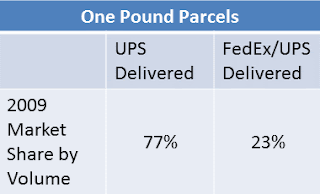In his use of the Google test, Governor Pawlenty stated that "If you can find a good or service on the Internet, then the federal government probably doesn't need to be doing it." Is it possible that he wants to end the Postal Service as the headline writer for the Atlantic Wire wrote?
The writer of NBC' News' First Read column asked the question: "Does Pawlenty realize that UPS and Fed Ex don’t deliver to some rural parts of the country? How do you ensure mail for those folks? The real issue with the Postal Service is Congress' inability to allow it to make smart business decisions (like raising postage to a realistic level of say one whole dollar?!?!? Or shutting down some post offices). "
The question is critical as the Postal Service does provide services that the private sector does not. While contrary to the premise posited by NBC news, UPS and FedEx will deliver to every address in every zip-code in the United States and will make those deliveries according to service standards listed on their website, parcel shippers in the 1,120 most rural counties in the United States where over 13 million people live will be hard pressed to find a FedEx or UPS outlet within 25 miles, while they will likely find at least four Post Office locations within 25 miles. (In some of these most rural counties, there are 20 or more locations within 25 miles.)
In addition, UPS and FedEx price their delivery of lighter weight parcels to shift demand to services that require the Postal Service to make the delivery, either as the carrier that handles the parcel from origin to destination, or the carrier that just handles the last mile. Combining volumes handled by the private sector air and ground delivery services and First Class parcels and consolidator parcels under 1 pounds, the following table illustrates that the Postal Service delivers most of this volume. It should be noted that fully 33% of all one pound parcels, or 3/7 of what the Postal Service delivers is picked up from the shipper from UPS/FedEx or another carrier and then deposited in the mail stream for delivery.
While the Postal Service generates most of the volume in light weight parcels, private sector carriers generate over half of the revenue as delivery by FedEx Express, UPS Air, FedEx Ground, or UPS Ground is much more expensive than the end-to-end delivery service offered by the Postal Service or the joint line or consolidator-USPS service where revenue is usually split close to 50-50.
Not withstanding these facts, and similar ones that could be raised about the handling of financial transactions, print advertising, and periodicals, Governor Pawlenty has more-or-less doubled down on his Google test.
In response to a question from First Read, a Pawlenty spokesman emailed, “The Google Test highlights government programs and parts of government programs that are clearly duplicative of services now also provided by private sector.”
The Postal Service offers services that compete with the private sector in parcel delivery, transaction handling (e-bill and e-billpay), and advertising as well as other services. The fact that it competes with private sector does not mean that the services are duplicative and warrant shutting it down. Even though there are private sector substitutes, for many forms of communication, as well as many parcel customers, there is no direct substitute at a comparable price. Shutting down the Postal Service would threaten the entire postal market that generates over $1.1 billion in sales in the United States and employs over 6.6 million people while shippers and mailers waited until the private sector alternatives formed. Maybe a Republican in the mailing community should spend some time with Governor Pawlenty's staff to make it clear that tht he needs to make it clear that shutting down the Postal Service is a bad idea.
Wednesday, June 8, 2011
Subscribe to:
Post Comments (Atom)





No comments:
Post a Comment